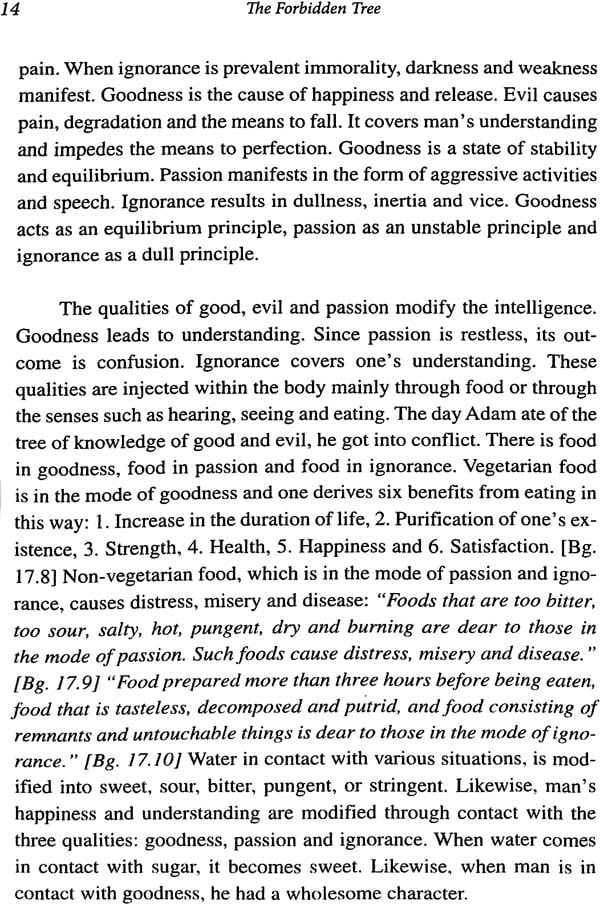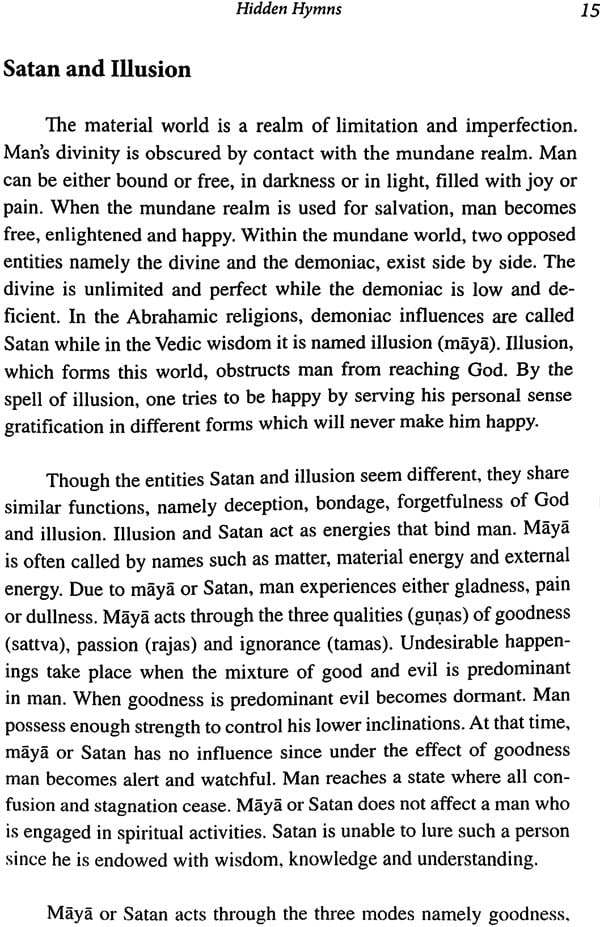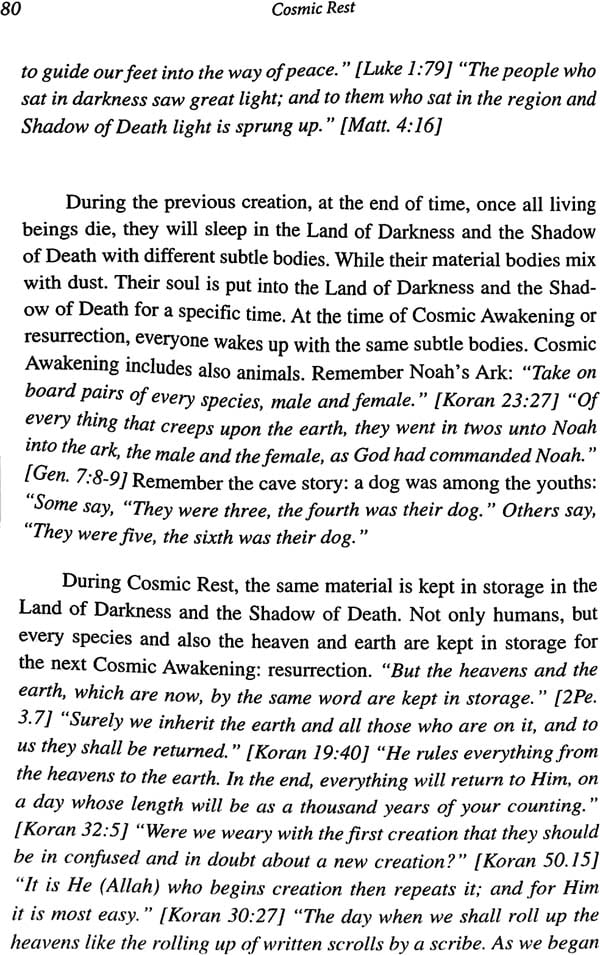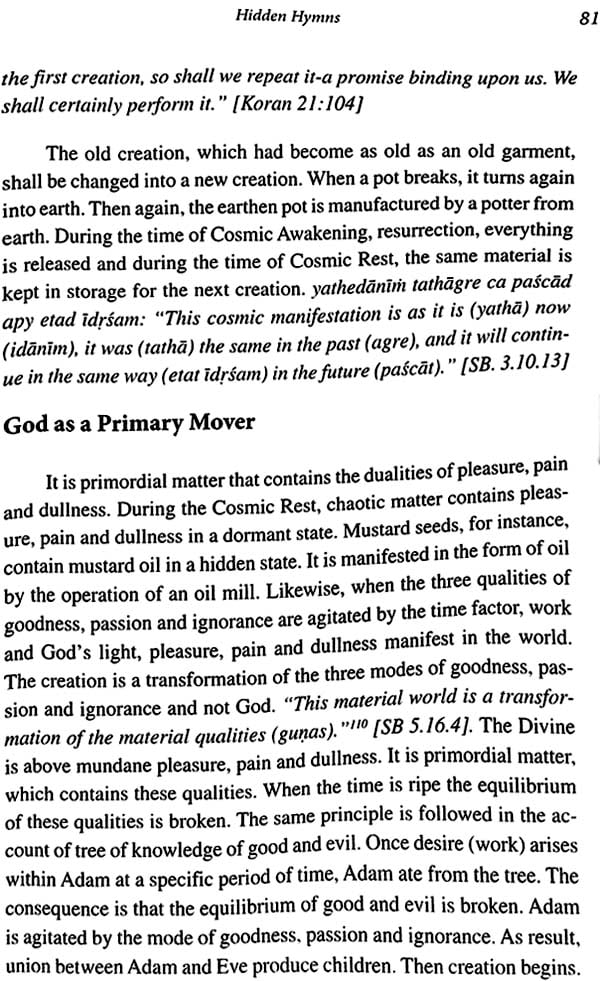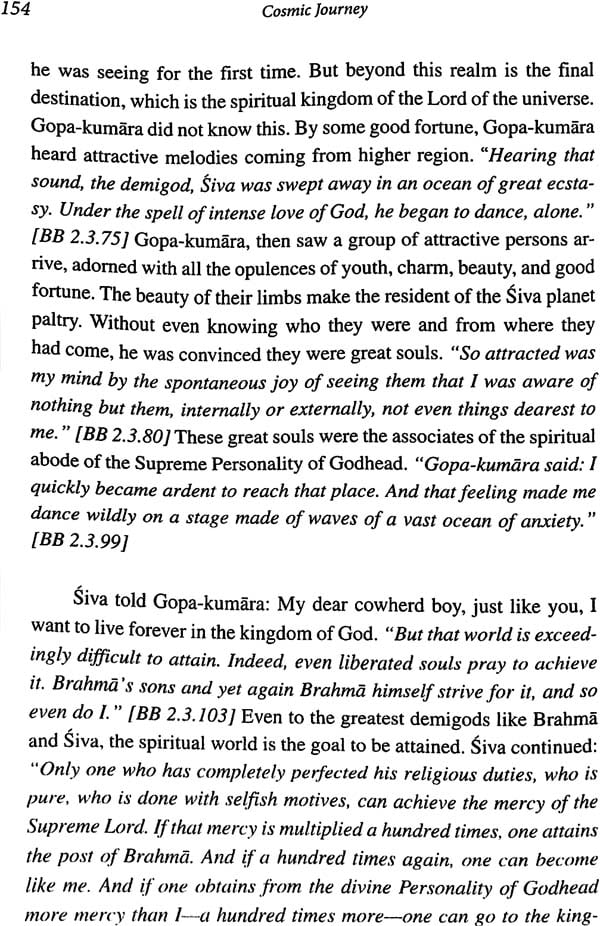
Hidden Hymns (A Comparative Study Between Judaism, Christianity, Islam and The Vedas)
Book Specification
| Item Code: | NAP115 |
| Author: | Rasamandala Das |
| Publisher: | Blue Lotus |
| Language: | English |
| Edition: | 2018 |
| Pages: | 185 |
| Cover: | Paperback |
| Other Details | 8.5 inch X 5.5 inch |
| Weight | 180 gm |
Book Description
Can an unintelligent person be wise? An unwise person may quote verses from scriptures and repeat passages from great authors, but his ignorance still remains. An unwise person will not abandon his erroneous so-called truths for evident conclusions. He is scared to give up his untenable belief for reasonable principles. Ignorance can only be broken out of when one is aware of it. A man is able to rise above himself by observing the roughness, pride and arrogance of his thoughts. An unintelligent man accepts vague notions without considering their tenet. Arbitrary acceptance of certain precepts is detrimental to oneself. These isolations ultimately destroy freedom. To be wise, one has to be a lover of understanding. Facts create order, sympathy and equilibrium. The capacity to think clearly and sanely requires understanding. As stated: “Brethren, be not children in understanding. In malice be children, but in understanding be men.” [ Cor. 14.20] “Science without religion is lame; religion without science is blind.” [Albert Einstein] “Religion without philosophy is sentiment, or sometimes fanaticism, while philosophy without religion is mental speculation,” [SrilaA.C. Bhaktivedanta Swami Prabhupada] “None will grasp the message but of understanding.” [Koran 2. 2.269]
Philosophy and understanding are synonymous since superfluous information hinders one’s clarity of thinking. Man should not be taken away from the central issue, which is seeking the truth. To be wise, requires psychological discerning, attention and endeavour. One has to change his unconscious thinking that he has superficially built up as a self protective shield. The point is that man is afraid of discovering facts. He wants to escape realities since discovering facts may be painful. To remove his daily conflicts and conceal his contradictions, man conjectures. His speculations shape his actions that are bound to end in confusion, conflict and antagonism. Man wants peace only as an idea, but not as a reality. His resolution is to willingly withdraw from the truth. Out of lack of modesty, he denies, blames and justifies.
Truth is not merely a question of belonging to a certain belief. Communal designations have no place in asserting the truth. To escape the truth, man invented many confused ways by giving them lovely names. Within each religion, man has invented many speculative views that had become deeply rooted as unshakable beliefs. Such opinions divide, bind and separate man from man, followers from followers and create intolerance. If God is one, truth must be one Many believers are confused. To get out of these confusions, facts are necessary. Man should not just be satisfied with outward superficial symbols because it gives him a sense of importance, being respected and great. To perceive the truth man has to first remove errors of misconceptions. Wisdom arises when one is free from carrying the burden of old misconceptions. Whenever there is a challenge, man either ignores facts or aggressively responds according to what he has learned as ideal.
Can soil bring forth trees without receiving sees, water and care? Can cars move without drivers? Can creation arise out of nothing? If nature demonstrates that these things are not possible, how can the so-called religious man believe in these superstitious theories? Is there any conflict between God and nature? God is taken as an irrational person. One may claims that scriptures are replete with instances where God supernaturally intervenes against the laws of physics and nature. Examples are the parting of the Red Sea [Ex. 14:21], [Koran 2:50] the turning back of the shadow of the sundial [2 Ki. 20: 9] the stopping of the Earth‘s rotation for about 24 hours [Jos. 10:12-14], and the virgin birth of Jesus Christ. Do you believe that God did all can create something out of nothing? Why can’t God resurrect a dead body from the grave? Can such things be explained or defended scientifically? No. Then, believe in them without doubt.
To such a claim, the answer is: are these miracles fundamental laws? Are all virgins having immaculate conceptions? Does the rotation of the Earth often stop? Do all the seas miraculously divide? The so –called religious man has to realize that these miracles are exceptions that have just happened once. They are not physical laws. Miracles are meant to increase the faith of the ignorant, and to puzzle the understanding of the wise. For instance, for the ignorant, an explosion is a miracle. But for the wise, a process is behind the explosion. By combining different elements, the explosion takes place. When the ignorant is unaware of the process, he sees it as a miracle. The wise knows the process of how God performs wonders while the ignorant he wants to impose his blind thinking upon physical laws. His outlook is in conflict with nature. Since darkness covers his understanding, he cannot grasp the truth about the laws of God. He is consciously or unconsciously defensive as to facts. Fear corrupts his understanding. He incorrectly thinks that to be a lover of understanding leads to hell. He His urge is to show that his fictitious theories are right. Such a claim engenders a corrupting intellectual power. His search is irrevocably deceptive and useless.
Contents
| Introduction | 1 | |
| I | The Forbidden Tree | |
| Opposite Events | 10 | |
| Concord not Discord | 13 | |
| Satan and Illusion | 16 | |
| The Effects of Approaching the Tree | 18 | |
| II | A Puzzling Subject | |
| Aristotle and Motion | 24 | |
| The Collapse of Aristotle's Model | 26 | |
| Motion by Friction | 29 | |
| Newton and Motion | 31 | |
| Unsolved Mystery | 33 | |
| Divinity in Nature | 35 | |
| III | Deficient Views | |
| Out of Nothing | 41 | |
| Nothing Comes from Nothing | 42 | |
| Can A Temporal Event Proceed from the Eternal | 45 | |
| God's Interactions with Matter | 47 | |
| IV | Secondary Movers | |
| Motion in Nature | 50 | |
| Secondary Deities | 52 | |
| Celestial and Solar Times | 54 | |
| Burning Isssues | 55 | |
| V | Primary Movers | |
| Let There Be Light | 60 | |
| The Sources of Sun 's Light | 63 | |
| Motion in Primordial Matter | 66 | |
| VI | Cosmic Rest | |
| Shadow of Death | 73 | |
| Cosmic Awakening | 76 | |
| God as a Primary Mover | 79 | |
| Agitation of Chaotic Matter | 82 | |
| The Only Begotten Son of God | 85 | |
| God Existed Before Creation | 87 | |
| The Firstborn is not Supreme | 91 | |
| VII | The Building of the Cosmos | |
| The Outer Court of the Tabernacle | 94 | |
| The Holy Place | 98 | |
| The Holy of Holies | 100 | |
| Mount Sinai | 101 | |
| Crossing Jordan | 108 | |
| Upper Chambers | 111 | |
| VIII | A Solid Firmament | |
| Rigid Firmament | 117 | |
| The Universal Shell | 120 | |
| Universal Boundaries' Crossing | 122 | |
| The Sevenfold Coverings | 125 | |
| Direct and Indirect Processes | 128 | |
| Realizing God's Light | 130 | |
| IX | Cosmic Journey | |
| The Earthly Realm | 133 | |
| The Heavenly Realm | 139 | |
| Single-Minded | 142 | |
| Reaching Higher Realms | 144 | |
| The Spiritual Kingdom | 150 | |
| References | 154 | |
| Bibliography | 163 | |
| Abbreviations used in this book | 166 |
Sample Pages
